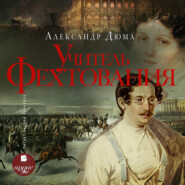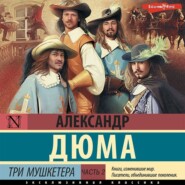По всем вопросам обращайтесь на: info@litportal.ru
(©) 2003-2024.
✖
The Prussian Terror
Настройки чтения
Размер шрифта
Высота строк
Поля
"There! it is done now!"
It was done so rapidly that no one could have supposed he had taken any aim at all. But, even as the report was heard, Herr Kleist's pistol was blown to pieces and he himself staggered and fell on one knee.
"Ah!" said Anderson, "you have killed him."
"I think not," replied Benedict. "I aimed between the two screws which hold the hammer. It is the shock of the concussion which has brought him down."
The surgeon and the two seconds hastened to the wounded man, who now held only the butt end of his pistol. There was a terrible bruise on his cheek, reaching from the eye to the jaw. Otherwise he was untouched, only the shock had knocked him down.
The barrel of the pistol was picked up on one side and the lock on the other. The ball had lodged exactly between the two screws. Had it continued its course unobstructed it would have broken the upper jaw and penetrated the brain.
The dressing was simple – the bruise was a very bad one, but the skin was only broken in two places, and the surgeon considered a cold-water bandage to be all that was required.
Benedict embraced the major, bowed to the journalist, shook hands with the seconds, put on his coat, and got into the carriage, looking less dishevelled than if he had come from a picnic.
"Well, my dear sponsor," he said to Colonel Anderson.
"Well, my dear godson," responded the latter, "I know at least ten men besides myself who would willingly have given a thousand pounds to see what I have seen to-day."
"Sir," said Lenhart, "if you would promise neither to hunt nor to fight unless I am there to see, I, my horse, and my carriage should be at your service for the rest of my life."
And indeed, Benedict returned as he had foretold, having fought his duels, vanquished his adversaries, and come off without a single scratch!
CHAPTER X
"WHAT WAS WRITTEN IN A KING'S HAND"
When Benedict returned to his hotel he was met by Kaulbach's servant, sent by his master to learn what had happened. In the good town of Hanover it had speedily become known that in answer to Benedict's letter in the "Gazette" two challenges had been received that very morning, and that he, his challengers, and seconds, had all gone to Eilenriede, the usual place for settling affairs of this description. Benedict desired him to assure his master that all was well, adding that he would have come in person to acknowledge his courtesy, had he not feared to rouse the curiosity of the whole town.
Colonel Anderson had made an excuse for leaving Benedict as soon as they returned. Being an officer of the Royal Ordnance he had probably some report to make to the king.
The news of the result of this double combat spread as rapidly as had that of the challenges. Such an event as two duels successfully fought without a scratch being received was quite unheard of, and was considered so extraordinary that the young men of the town, who also had no love for the Prussians, sent a deputation to congratulate Benedict on his success. He received the deputies and replied in such excellent German that they retired marvelling more than ever.
The doors had scarcely closed on them when Stephen appeared, and announced that all his guests were so interested in the events of the day that they begged Benedict would honour them by dining at the table d'hôte, in order that they might all have the pleasure of personally congratulating him.
Benedict replied that he did not in the least understand so much admiration for his perfectly natural conduct, but that he was quite willing to do anything which might be agreeable to his fellow guests.
Stephen had time to let the news circulate in the town that the young Frenchman of whom every one was talking, would, for once only, consent to dine at the table d'hôte. Instead of twenty-five only, he had covers laid for two hundred guests. Every place was occupied.
The police feared disorder of some kind, and came to investigate. They were assured that it was only a family affair, a demonstration such as had been made three days before under the windows of Count von Bismarck – only it was the other way about! Now the Hanoverian police was an excellent body, which highly approved of family fêtes and patriotic demonstrations. Therefore, instead of objecting to this one they encouraged it with all their power, thanks to which all passed off in perfect order.
At midnight, Benedict was at length allowed to retire, but his admirers organized a serenade beneath his windows which lasted till two o'clock in the morning.
At nine Kaulbach entered his room. The Crown Prince invited Benedict to breakfast at the Palace of Herrenhausen, and requested him to bring his sketches. Kaulbach was commissioned to bring him back. The breakfast was at eleven, but the prince would be obliged if Benedict would come at ten in order to have some time for conversation both before and after.
Benedict lost no time in dressing, and although Kaulbach, intimate at the palace, assured him he could go in ordinary costume, he preferred to wear the naval uniform in which he had made the Chinese campaign. On his breast was the Cross of the Légion d'Honneur, of which the simple red ribbon means much more when worn by some than do the various grand crosses worn by others. He added a sabre, the gift of Said Pasha, took his sketches, and got into the carriage with Kaulbach.
Lenhart had a whole day's holiday.
Twenty-five minutes brought them to Herrenhausen, which is about a league from Hanover, and, the carriage being open, Benedict could see the young prince watching for him eagerly at a window. He was accompanied only by his aide-de-camp, an officer of Engineers, and consequently well able to draw. Also, which is more unusual, he did not disdain the picturesque.
The prince enquired courteously after Benedict's health, without making the smallest allusion to the duels of the day before. It was evident nevertheless that he knew all about them. Had there been any doubts on the subject they would have been dispelled by the appearance of Colonel Anderson as another invited guest.
But the prince's chief interest centred in the portfolio which Benedict carried under his arm.
Anticipating his wishes, Benedict observed;
"Your Highness wished to see some of my sketches. I have brought some representing hunting incidents, thinking that they might interest you most."
"Oh! let me see, let me see!" exclaimed the prince, extending his hand, and placing the portfolio on the piano, he began eagerly to examine the contents. After having turned over several, "Ah," said he, "but they are beautiful. Will you not tell me something of the adventures which I am sure they illustrate? They must be so interesting."
Benedict endeavoured to gratify the prince, and the time both before and after the breakfast passed rapidly in listening to accounts of elephant hunting, of encounters with pirates in the Straits of Malacca, of adventures in the Caucasus, and he had just finished an especially thrilling anecdote relating to the poisonous snakes of India when the king was seen approaching from the gallery. He held the arm of his aide-de-camp with whom he was conversing and walked firmly as if able to see. He entered the dining-room without being announced. The four guests rose immediately, but:
"Do not let me disturb you, gentlemen," said the king. "I merely came to visit the prince, to ask if he has all he wants, and if not, to convey his wishes to the persons concerned."
"No! thanks to Your Majesty's kindness, nothing is wanting here except yourself. Your knowledge of men has not deceived you, and Monsieur Benedict is the most delightful companion I ever met."
"The prince is imaginative, sire," said Benedict laughing. "He attributes to some very simple anecdotes and hasty sketches an excellence which they do not possess."
But the king replied as if answering his own thought, the thought which had led him to visit the young man.
"Yesterday," he said, addressing Benedict and turning towards him, as he always did in conversation, "you said something about a science which interested me in former days, namely, chiromancy. My thoughts carry me on towards the mysterious unexplored regions of the human mind, of nature, of creation. I should like to know they are based upon logic, on physiology, for instance."
"I know, sire," replied Benedict, smiling, "that is why I ventured yesterday to mention the occult sciences to Your Majesty."
"You know. But how?" demanded the king.
"I should be a poor student, sire, if I had limited my enquiries to the hands only, and had not united the study of Lavater and Gall to that of Arpentigny. I saw at once in the form of your hands and head those precious aptitudes which are shown in phrenology by the well-developed organs of the poetic faculty and of the love of harmony, which betoken the student of natural science. The protection accorded by Your Majesty to the poor herbalist, Lampe, arose not from benevolence only, but from the conviction that certain men are empowered to receive a revelation, and that it is not always the highly placed ones of earth to whom truth is thus manifested."
"It is true," said the king. "Other men may see the stars shining in the midnight silence, but it seems to me that I actually hear that 'music of the spheres' spoken of by Pythagoras. And I am proud to think that while I stand on the summit of earthly society, there are, immediately above me, intermediate angelic influences which carry on a boundless electric chain, linking us not merely with our own little planetary system, but with others – with the whole universe."
"I do not venture," the king continued with a smile, "to discourse openly on these beliefs. I should get the reputation of 'a king of dreams,' about the worst a king can have. But to you, who are a dreamer like myself, I do say – yes, I believe in these celestial influences, and I believe that each mortal has, in that precious casket which he calls his skull, the signs of his destiny. He may strive to alter or delay its course, but it will bear him on irresistibly to fortune, success, or misery, as the case may be.
"And I speak with conviction because I have had proofs. In early youth I once met a gipsy woman in the course of a solitary walk. She examined my hand and told me certain things which came to pass. I wish to believe you, but I must have proofs. Can you read the past in my hand even as the gipsy read the future. Can you, do you, sincerely believe you have this power?"
"I do, sire. And I think actual science will tell you what has before been perhaps merely guessed at by intuition or tradition."
"Well then," said the king, extending his hand, "now tell me what you read."
"Sire," replied Benedict, "I do not know how far I dare – "
"Dare what?" enquired the king.
"What if I read only a threatening future?"
"We live in days when no predictions, however terrible, can exceed the reality of the convulsions which are taking place around us. What can you predict for me that can be so terrible? Is it the loss of my kingdom? I lost more than a kingdom when I lost the vision of sun and sky, of earth and sea. Take my hand, and tell me what is written."
"Everything?"
It was done so rapidly that no one could have supposed he had taken any aim at all. But, even as the report was heard, Herr Kleist's pistol was blown to pieces and he himself staggered and fell on one knee.
"Ah!" said Anderson, "you have killed him."
"I think not," replied Benedict. "I aimed between the two screws which hold the hammer. It is the shock of the concussion which has brought him down."
The surgeon and the two seconds hastened to the wounded man, who now held only the butt end of his pistol. There was a terrible bruise on his cheek, reaching from the eye to the jaw. Otherwise he was untouched, only the shock had knocked him down.
The barrel of the pistol was picked up on one side and the lock on the other. The ball had lodged exactly between the two screws. Had it continued its course unobstructed it would have broken the upper jaw and penetrated the brain.
The dressing was simple – the bruise was a very bad one, but the skin was only broken in two places, and the surgeon considered a cold-water bandage to be all that was required.
Benedict embraced the major, bowed to the journalist, shook hands with the seconds, put on his coat, and got into the carriage, looking less dishevelled than if he had come from a picnic.
"Well, my dear sponsor," he said to Colonel Anderson.
"Well, my dear godson," responded the latter, "I know at least ten men besides myself who would willingly have given a thousand pounds to see what I have seen to-day."
"Sir," said Lenhart, "if you would promise neither to hunt nor to fight unless I am there to see, I, my horse, and my carriage should be at your service for the rest of my life."
And indeed, Benedict returned as he had foretold, having fought his duels, vanquished his adversaries, and come off without a single scratch!
CHAPTER X
"WHAT WAS WRITTEN IN A KING'S HAND"
When Benedict returned to his hotel he was met by Kaulbach's servant, sent by his master to learn what had happened. In the good town of Hanover it had speedily become known that in answer to Benedict's letter in the "Gazette" two challenges had been received that very morning, and that he, his challengers, and seconds, had all gone to Eilenriede, the usual place for settling affairs of this description. Benedict desired him to assure his master that all was well, adding that he would have come in person to acknowledge his courtesy, had he not feared to rouse the curiosity of the whole town.
Colonel Anderson had made an excuse for leaving Benedict as soon as they returned. Being an officer of the Royal Ordnance he had probably some report to make to the king.
The news of the result of this double combat spread as rapidly as had that of the challenges. Such an event as two duels successfully fought without a scratch being received was quite unheard of, and was considered so extraordinary that the young men of the town, who also had no love for the Prussians, sent a deputation to congratulate Benedict on his success. He received the deputies and replied in such excellent German that they retired marvelling more than ever.
The doors had scarcely closed on them when Stephen appeared, and announced that all his guests were so interested in the events of the day that they begged Benedict would honour them by dining at the table d'hôte, in order that they might all have the pleasure of personally congratulating him.
Benedict replied that he did not in the least understand so much admiration for his perfectly natural conduct, but that he was quite willing to do anything which might be agreeable to his fellow guests.
Stephen had time to let the news circulate in the town that the young Frenchman of whom every one was talking, would, for once only, consent to dine at the table d'hôte. Instead of twenty-five only, he had covers laid for two hundred guests. Every place was occupied.
The police feared disorder of some kind, and came to investigate. They were assured that it was only a family affair, a demonstration such as had been made three days before under the windows of Count von Bismarck – only it was the other way about! Now the Hanoverian police was an excellent body, which highly approved of family fêtes and patriotic demonstrations. Therefore, instead of objecting to this one they encouraged it with all their power, thanks to which all passed off in perfect order.
At midnight, Benedict was at length allowed to retire, but his admirers organized a serenade beneath his windows which lasted till two o'clock in the morning.
At nine Kaulbach entered his room. The Crown Prince invited Benedict to breakfast at the Palace of Herrenhausen, and requested him to bring his sketches. Kaulbach was commissioned to bring him back. The breakfast was at eleven, but the prince would be obliged if Benedict would come at ten in order to have some time for conversation both before and after.
Benedict lost no time in dressing, and although Kaulbach, intimate at the palace, assured him he could go in ordinary costume, he preferred to wear the naval uniform in which he had made the Chinese campaign. On his breast was the Cross of the Légion d'Honneur, of which the simple red ribbon means much more when worn by some than do the various grand crosses worn by others. He added a sabre, the gift of Said Pasha, took his sketches, and got into the carriage with Kaulbach.
Lenhart had a whole day's holiday.
Twenty-five minutes brought them to Herrenhausen, which is about a league from Hanover, and, the carriage being open, Benedict could see the young prince watching for him eagerly at a window. He was accompanied only by his aide-de-camp, an officer of Engineers, and consequently well able to draw. Also, which is more unusual, he did not disdain the picturesque.
The prince enquired courteously after Benedict's health, without making the smallest allusion to the duels of the day before. It was evident nevertheless that he knew all about them. Had there been any doubts on the subject they would have been dispelled by the appearance of Colonel Anderson as another invited guest.
But the prince's chief interest centred in the portfolio which Benedict carried under his arm.
Anticipating his wishes, Benedict observed;
"Your Highness wished to see some of my sketches. I have brought some representing hunting incidents, thinking that they might interest you most."
"Oh! let me see, let me see!" exclaimed the prince, extending his hand, and placing the portfolio on the piano, he began eagerly to examine the contents. After having turned over several, "Ah," said he, "but they are beautiful. Will you not tell me something of the adventures which I am sure they illustrate? They must be so interesting."
Benedict endeavoured to gratify the prince, and the time both before and after the breakfast passed rapidly in listening to accounts of elephant hunting, of encounters with pirates in the Straits of Malacca, of adventures in the Caucasus, and he had just finished an especially thrilling anecdote relating to the poisonous snakes of India when the king was seen approaching from the gallery. He held the arm of his aide-de-camp with whom he was conversing and walked firmly as if able to see. He entered the dining-room without being announced. The four guests rose immediately, but:
"Do not let me disturb you, gentlemen," said the king. "I merely came to visit the prince, to ask if he has all he wants, and if not, to convey his wishes to the persons concerned."
"No! thanks to Your Majesty's kindness, nothing is wanting here except yourself. Your knowledge of men has not deceived you, and Monsieur Benedict is the most delightful companion I ever met."
"The prince is imaginative, sire," said Benedict laughing. "He attributes to some very simple anecdotes and hasty sketches an excellence which they do not possess."
But the king replied as if answering his own thought, the thought which had led him to visit the young man.
"Yesterday," he said, addressing Benedict and turning towards him, as he always did in conversation, "you said something about a science which interested me in former days, namely, chiromancy. My thoughts carry me on towards the mysterious unexplored regions of the human mind, of nature, of creation. I should like to know they are based upon logic, on physiology, for instance."
"I know, sire," replied Benedict, smiling, "that is why I ventured yesterday to mention the occult sciences to Your Majesty."
"You know. But how?" demanded the king.
"I should be a poor student, sire, if I had limited my enquiries to the hands only, and had not united the study of Lavater and Gall to that of Arpentigny. I saw at once in the form of your hands and head those precious aptitudes which are shown in phrenology by the well-developed organs of the poetic faculty and of the love of harmony, which betoken the student of natural science. The protection accorded by Your Majesty to the poor herbalist, Lampe, arose not from benevolence only, but from the conviction that certain men are empowered to receive a revelation, and that it is not always the highly placed ones of earth to whom truth is thus manifested."
"It is true," said the king. "Other men may see the stars shining in the midnight silence, but it seems to me that I actually hear that 'music of the spheres' spoken of by Pythagoras. And I am proud to think that while I stand on the summit of earthly society, there are, immediately above me, intermediate angelic influences which carry on a boundless electric chain, linking us not merely with our own little planetary system, but with others – with the whole universe."
"I do not venture," the king continued with a smile, "to discourse openly on these beliefs. I should get the reputation of 'a king of dreams,' about the worst a king can have. But to you, who are a dreamer like myself, I do say – yes, I believe in these celestial influences, and I believe that each mortal has, in that precious casket which he calls his skull, the signs of his destiny. He may strive to alter or delay its course, but it will bear him on irresistibly to fortune, success, or misery, as the case may be.
"And I speak with conviction because I have had proofs. In early youth I once met a gipsy woman in the course of a solitary walk. She examined my hand and told me certain things which came to pass. I wish to believe you, but I must have proofs. Can you read the past in my hand even as the gipsy read the future. Can you, do you, sincerely believe you have this power?"
"I do, sire. And I think actual science will tell you what has before been perhaps merely guessed at by intuition or tradition."
"Well then," said the king, extending his hand, "now tell me what you read."
"Sire," replied Benedict, "I do not know how far I dare – "
"Dare what?" enquired the king.
"What if I read only a threatening future?"
"We live in days when no predictions, however terrible, can exceed the reality of the convulsions which are taking place around us. What can you predict for me that can be so terrible? Is it the loss of my kingdom? I lost more than a kingdom when I lost the vision of sun and sky, of earth and sea. Take my hand, and tell me what is written."
"Everything?"

















